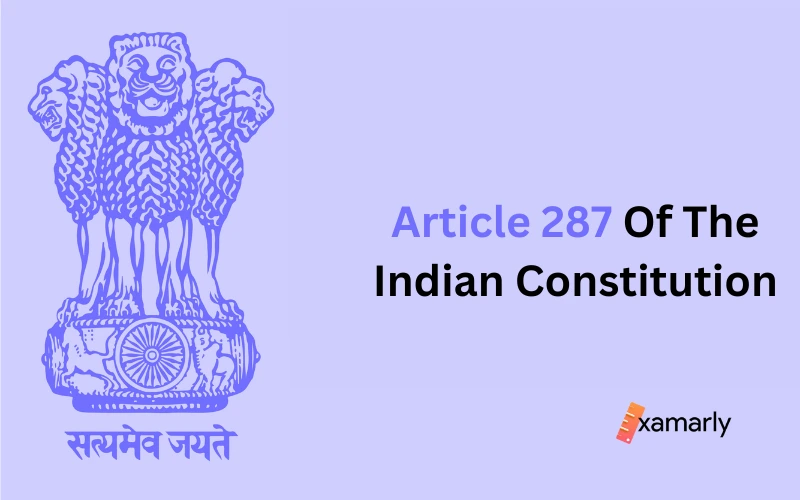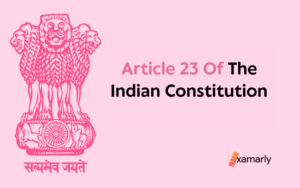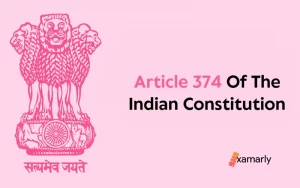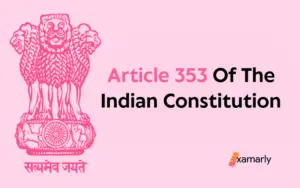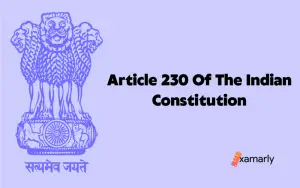An Overview
Article 287 of the Indian Constitution is included in Part XII of the Constitution of India, which deals with finance, property, contracts, and suits. This part of the Constitution lays down the provisions relating to the financial administration of the Union and the States, including the levying and collection of taxes, the borrowing of money, the management of the public debt, and the audit of the accounts belonging to the Union and the States.
Gain an insight into Article 287 of the Indian Constitution through this detailed blog. We will have a look at the official text of the article, try to analyse its contents, and also answer some of the frequently asked questions related to it.
- An Overview
- Background Of Article 287 Of The Indian Constitution
- What Does Article 287 Of The Indian Constitution Deal With?
- Explanation of Article 287 Of The Indian Constitution
- Summing Up
- FAQs Related To Article 287 Of The Indian Constitution
- Is There Any Provision In The Indian Constitution For The Exemption Of Certain Individuals Or Organisations From Taxes On Electricity?
- Is The Government Of India Charged For The Consumption Of Electricity?
- Which Government Body Has The Authority To Exempt The Levying Of Taxes From The Government Of India?
- Which Part Of The Indian Constitution Contains Article 287 Of The Indian Constitution?
- What Does Article 287 Of The Indian Constitution Tell Us About The Price Of Electricity That Is Sold To The Government Of India?
Background Of Article 287 Of The Indian Constitution
Before going deep into the contents of Article 287, let us first familiarise ourselves with a brief background of this article of the Indian Constitution.
- Article 287 of the Indian Constitution was finalised from Draft Article 265. This Draft Article was taken up for discussion in the Constituent Assembly on September 9, 1949.
- Through the provisions provided in the Article, the States were prohibited from levying any kind of tax on the sale as well as the consumption of electricity by the Union Government and the Union Railways as well.
- However, it rendered on the Parliament the power to allow the States to impose taxes on the sale of electricity to the Union. This was applicable as long as the final price for the sale of electricity for consumption was lower than the price offered to other consumers.
- During the discussion of this article, there was a proposal by a member to substitute “any railways” for “Union railways”. This revision was was approved without any debate or objection by the members.
- Another member came up with a suggestion. He stated that the Parliament should not be bestowed upon with the authority and power to formulate any law. This law would pertain to the imposition of taxes by the States. However, no discussion was held in this regard and the suggestion was dismissed altogether.
- The final version of Draft Article 265, as amended, was adopted on September 9, 1949.
What Does Article 287 Of The Indian Constitution Deal With?
The quoted text in the following paragraph has been taken up from the official document of the Constitution of India. Article 287 of the Indian Constitution reads as follows:
Exemption from taxes on electricity.—Save in so far as Parliament may by law otherwise provide, no law of a State shall impose, or authorise the imposition of, a tax on the consumption or sale of electricity (whether produced by a Government or other persons) which is—
(a) consumed by the Government of India, or sold to the Government of India for consumption by that Government; or
(b) consumed in the construction, maintenance or operation of any railway by the Government of India or a railway company operating that railway, or sold to that Government or any such railway company for consumption in the construction, maintenance or operation of any railway,
and any such law imposing, or authorising the imposition of, a tax on the sale of electricity shall secure that the price of electricity sold to the Government of India for consumption by that Government, or to any such railway company as aforesaid for consumption in the construction, maintenance or operation of any railway, shall be less by the amount of the tax than the price charged to other consumers of a substantial quantity of electricity.
As we can understand after reading the text of Article 287, that it is a constitutional provision which revolves around the exemption from taxation related to electricity.
In the following section, we will try to analyse the provisions of this article and try to determine its meaning. A detailed explanation has been provided below.
Explanation of Article 287 Of The Indian Constitution
Article 287 of the Indian Constitution provides that as per the law introduced by the Parliament, any State by means of its law is not permitted to levy any tax on the electricity that has been consumed by the Government of India or has been sold to the Government of India for consumption. The law of the State is not even permitted to approve the imposition of any such tax on the Government of India. This production of electricity could either be by a Government or by other persons.
The article further states that the electricity that is consumed or sold for the purpose of consumption in the railways, mostly pertaining to its construction, maintenance, or operation by the Government of India cannot be charged for the levying of any tax. The same applies to any railway company that has undertaken the responsibility of running that railway. Any railway that has been sold to that government or any company that is related to the railways and uses electricity for taking care of the construction, maintenance, or operation of any such railway also comes under the purview of this article.
In addition to that, Article 287 of the Indian Constitution also limits the power of any law that intends to impose or authorise the imposition of such a taxation that levies a charge on the sale on electricity. Such a law shall ensure that the amount that is being charged on the sale of electricity to the Government of India must be less by the amount of the tax levied as compared to the amount charged to usual consumers who make use of electricity in a substantial quantity.
In simple words, it can be said that Article 284 relates to the exemption that is allowed on the imposition of tax on electricity. The article states that when electricity is sold to the Government of India or to a railway company for use in the construction, maintenance, or operation of a railway, the price of the electricity must be lower than the price charged to other consumers by the amount of the tax that is imposed on the sale of electricity.
In other words, the Government of India and railway companies should receive a discount on the price of electricity because of the tax that is being imposed on the sale of electricity to other consumers.
These provisions for the exemption from taxation need to be adhered to under Article 287 of the Indian Constitution till the time the Parliament uses its legislation powers to alter the law in a desired way.
You Might Also Like:
Article 283 Of The Indian Constitution
Article 284 of The Indian Constitution
Article 285 Of The Indian Constitution
Article 286 Of The Indian Constitution
Summing Up
After thoroughly going through Article 287, we can come up with some conclusions. They have been listed below:
- Article 287 of the Indian Constitution refers to an exemption from taxes on electricity that is granted to the Government of India and the operation of railways.
- The exemption applies to electricity that is consumed or sold by the Government of India, or consumed in the construction, maintenance, or operation of a railway by the Government of India or a railway company.
- This exemption is subject to the provision that the Parliament may by law otherwise provide, meaning that it may be amended or altered by legislation passed by the Parliament.
- Also, the exemption requires that any law with respect to imposition of tax on the sale of electricity must ensure that the price of electricity sold to the Government of India or a railway company is less by the amount of the tax than the price charged to other consumers of a substantial quantity of electricity.
FAQs Related To Article 287 Of The Indian Constitution
Is There Any Provision In The Indian Constitution For The Exemption Of Certain Individuals Or Organisations From Taxes On Electricity?
It is possible that certain individuals or organisations may be eligible for exemptions from taxes on electricity under the laws and regulations of the specific jurisdiction. However, such exemptions would not be specifically provided for in the Indian Constitution.
Is The Government Of India Charged For The Consumption Of Electricity?
No, as per the provisions provided by the clauses of Article 287 of the Indian Constitution, the Government of India is not liable to be charged for the consumption of electricity or the electricity that is sold to them.
Which Government Body Has The Authority To Exempt The Levying Of Taxes From The Government Of India?
The Authority to exempt the Government of India from being charged for the electricity that is sold and consumed by them lies with the the Parliament.
The Parliament, by means of its legislation powers can introduce laws which may otherwise provide so.
Which Part Of The Indian Constitution Contains Article 287 Of The Indian Constitution?
Article 287 Of The Indian Constitution is contained in Part XII of the Constitution of India. This part of the constitution holds articles that deal with finance, property, contracts, and suits.
What Does Article 287 Of The Indian Constitution Tell Us About The Price Of Electricity That Is Sold To The Government Of India?
As per the provisions of Article 287 of the Indian Constitution, the price of electricity that is sold to the Government of India, for consumption by that Government, or to any such railway company shall be lower, by the amount of the tax, than the price that is charged to other consumers of a substantial quantity of electricity. This applies to both the consumption of electricity by the Government of India, as well as the consumption of electricity by that railway company.


